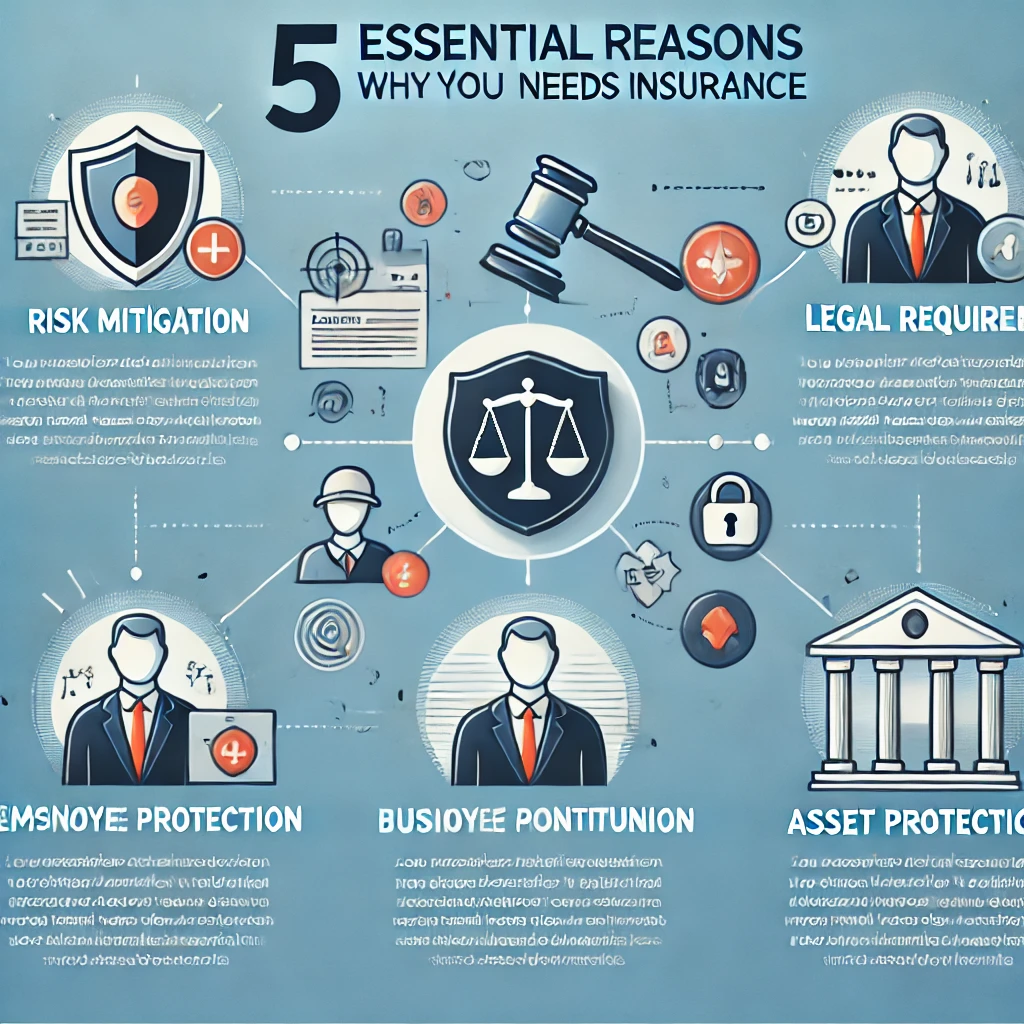Running a business involves risks. From natural disasters to unforeseen liabilities, businesses face numerous challenges that can jeopardize their operations. Business insurance acts as a safety net, helping companies protect their assets, employees, and reputation. In this article, we will delve into five essential reasons why your business needs insurance.
What Is Business Insurance?
Business insurance is a broad term that covers different types of policies designed to protect businesses from financial losses. These losses can arise from property damage, legal claims, employee-related risks, and more. The type of coverage you need depends on the nature and size of your business, but having some form of insurance is non-negotiable for sustainable operations.
Why Is Business Insurance Important?
The importance of business insurance lies in its ability to safeguard your enterprise against unpredictable events. Whether you’re a startup or a well-established company, insurance ensures continuity and reduces financial burden during crises. Now, let’s explore the five essential reasons why your business needs insurance.
1. Protection Against Legal Liabilities
Every business, regardless of its size, is vulnerable to lawsuits. Legal disputes can arise from employee injuries, customer complaints, or contractual disagreements. Without adequate insurance, a single lawsuit can drain your resources and tarnish your reputation.
Key Points to Consider:
- General Liability Insurance: Covers third-party claims for bodily injury, property damage, and advertising injuries.
- Professional Liability Insurance: Protects businesses offering services against claims of negligence or mistakes.
- Product Liability Insurance: Essential for businesses that manufacture or sell products, guarding against defective product claims.
By having the right liability coverage, you can focus on growing your business without the constant fear of legal repercussions.
2. Safeguarding Physical Assets
Your business likely relies on physical assets such as buildings, equipment, and inventory. These assets are susceptible to risks like fires, theft, or natural disasters. Replacing or repairing damaged assets can be costly without insurance.
Types of Coverage:
- Property Insurance: Covers the cost of repairing or replacing damaged physical assets.
- Business Interruption Insurance: Compensates for lost income if your operations are temporarily halted due to covered perils.
Having this type of insurance ensures that unexpected events don’t cripple your operations or cause significant financial strain.
3. Compliance With Legal and Contractual Obligations
Many industries and jurisdictions require businesses to carry specific types of insurance to operate legally. Additionally, clients or partners may insist on insurance coverage as a condition for contracts.
Common Requirements:
- Workers’ Compensation Insurance: Mandatory in most regions to cover employee injuries or illnesses incurred on the job.
- Commercial Auto Insurance: Required for vehicles used for business purposes.
- Client-Requested Coverage: Many clients demand proof of liability or professional insurance before signing contracts.
Failing to meet these requirements can lead to fines, legal issues, or lost business opportunities. Insurance ensures compliance and builds trust with stakeholders.
4. Protecting Employees’ Well-Being
Your employees are one of your most valuable assets. Providing them with a safe and supportive environment is not only ethical but also a sound business practice. Insurance plays a critical role in protecting your workforce.
Benefits of Employee-Centric Coverage:
- Workers’ Compensation: Covers medical expenses and lost wages for employees injured at work.
- Health Insurance: Boosts morale and attracts top talent by offering healthcare benefits.
- Disability Insurance: Provides financial support to employees unable to work due to illness or injury.
Investing in employee insurance shows that you value your team, which can improve retention rates and enhance productivity.
5. Ensuring Business Continuity
Unforeseen events like natural disasters, cyberattacks, or pandemics can disrupt your business operations. Without insurance, recovery can be a daunting task that threatens your company’s survival.
Critical Coverage Areas:
- Business Interruption Insurance: Covers lost revenue and ongoing expenses during downtime.
- Cyber Liability Insurance: Protects against data breaches and cyberattacks, which can cripple modern businesses.
- Key Person Insurance: Provides financial stability if a key executive or employee is unable to work.
With these policies in place, your business can weather challenges and resume operations with minimal disruption.
How to Choose the Right Insurance for Your Business
Selecting the right insurance coverage requires a clear understanding of your business’s risks and needs. Here are some tips:
- Assess Risks: Identify the specific risks associated with your industry and operations.
- Consult Professionals: Work with insurance agents or brokers to determine the best policies for your business.
- Review Regularly: Reassess your coverage periodically to ensure it aligns with your evolving needs.
- Consider Bundled Policies: Many insurers offer bundled packages like Business Owner’s Policies (BOPs) that combine essential coverage at a lower cost.
Conclusion
Business insurance is not just an expense; it’s an investment in the future of your company. By protecting against legal liabilities, safeguarding assets, ensuring compliance, supporting employees, and securing continuity, insurance provides peace of mind and financial stability. Regardless of your business size or industry, having the right coverage is essential for long-term success.
Make insurance a priority today to safeguard your business against the uncertainties of tomorrow


